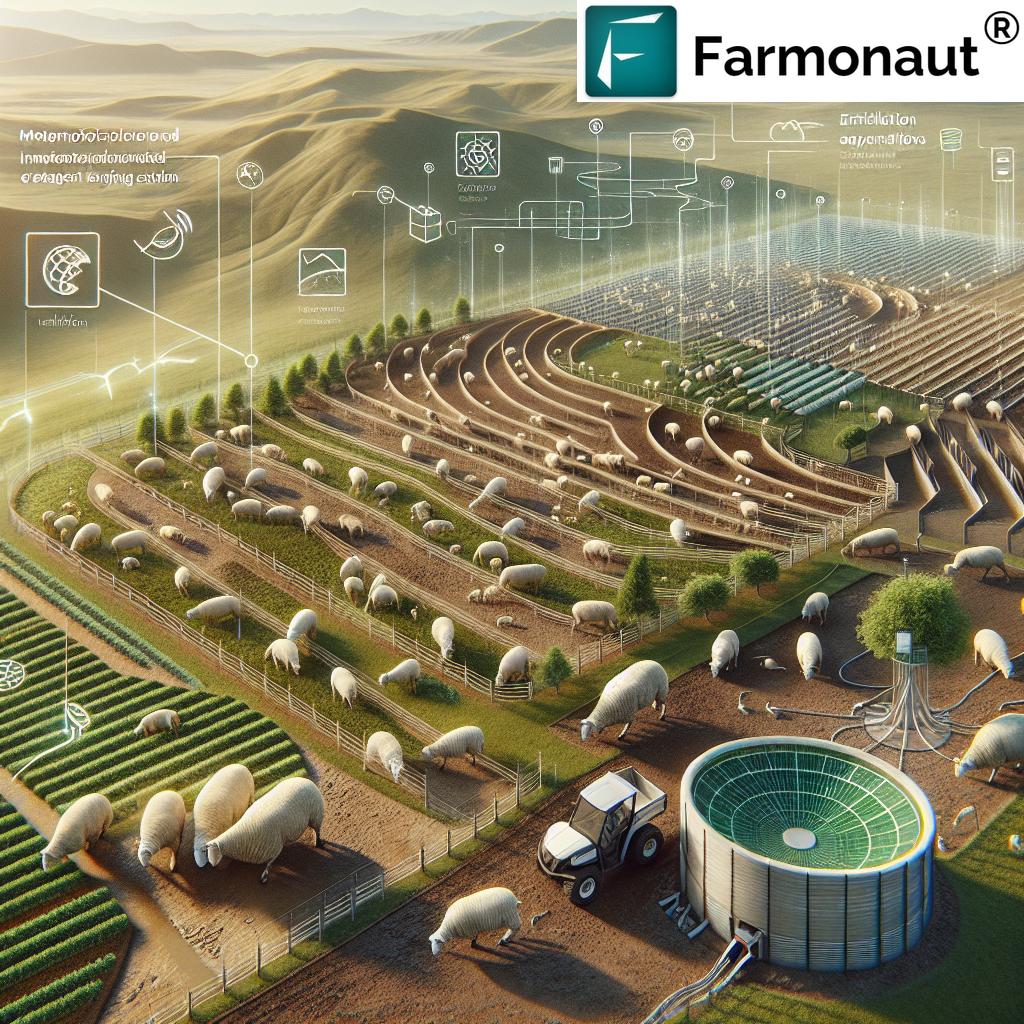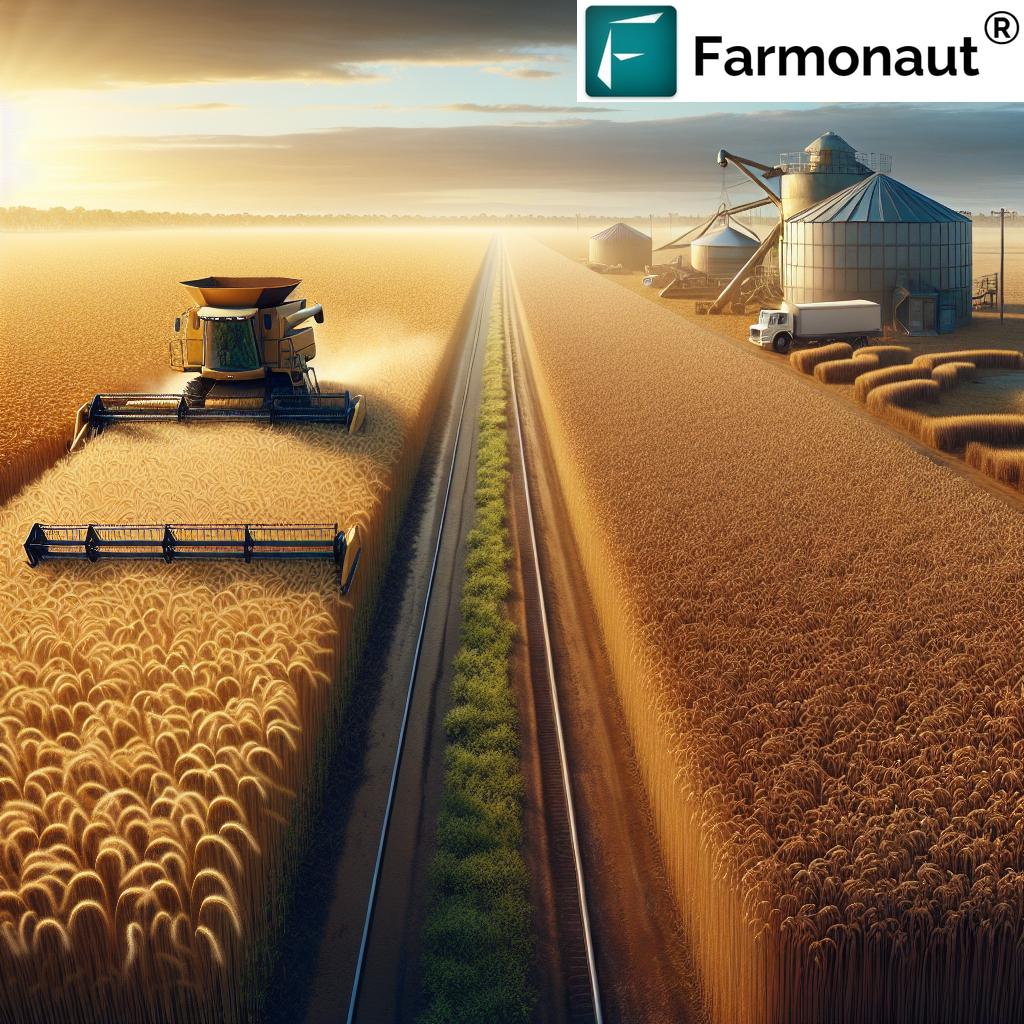Revolutionizing Sheep Farming: How a Digital Management App Boosts Efficiency and Sustainability in Australia
“Australian sheep farmers using digital management apps report up to 30% increase in operational efficiency.”
Welcome to our comprehensive exploration of how cutting-edge technology is transforming the landscape of sheep farming in Australia. In this blog post, we’ll delve into the revolutionary impact of digital management apps on sustainable farming practices and agricultural efficiency. As we navigate through the intricacies of modern sheep farming techniques, we’ll uncover how these innovative solutions are not just changing the game but redefining it entirely.

The Digital Revolution in Australian Sheep Farming
In the vast expanses of Australia, where sheep farming has been a cornerstone of agriculture for centuries, a new era is dawning. The integration of digital management apps into traditional farming practices is not just a trend; it’s a necessity in our rapidly evolving agricultural landscape. These smart agriculture solutions are empowering farmers with tools that were once the stuff of science fiction.
Let’s break down how these digital farm management tools are revolutionizing the industry:
- Real-time Livestock Tracking: Gone are the days of manual headcounts and guesswork. Digital apps now offer precise, up-to-the-minute data on flock locations and movements.
- Health Monitoring: Advanced algorithms can detect early signs of illness, allowing for proactive veterinary care.
- Nutritional Management: Apps provide insights into optimal feeding schedules and dietary requirements, tailored to each flock’s needs.
- Environmental Sustainability: By optimizing resource use, these tools help reduce the environmental footprint of sheep farming.
As we dive deeper into these features, we’ll see how they collectively contribute to a more efficient, profitable, and sustainable sheep farming enterprise.
The Power of Livestock Tracking Technology
One of the most transformative aspects of digital sheep management apps is their advanced livestock tracking capabilities. This technology is not just about knowing where your sheep are; it’s about understanding their patterns, behaviors, and needs on a granular level.
Here’s how livestock tracking technology is revolutionizing sheep farming:
- GPS Tracking: Each animal can be fitted with a GPS collar, allowing farmers to monitor their location in real-time. This is particularly useful for large properties or during extreme weather events.
- Behavior Analysis: By analyzing movement patterns, farmers can identify anomalies that might indicate health issues or predator threats.
- Grazing Optimization: Understanding grazing patterns helps in efficient pasture management, ensuring optimal use of land resources.
- Theft Prevention: With real-time tracking, the risk of livestock theft is significantly reduced, providing peace of mind to farmers.
The integration of this technology into everyday farm management has led to remarkable improvements in operational efficiency and animal welfare. Farmers can now make informed decisions quickly, based on accurate, real-time data.
Enhancing Agricultural Efficiency Through Digital Solutions
The impact of digital management apps on agricultural efficiency in sheep farming cannot be overstated. These tools are not just about tracking; they’re about optimizing every aspect of farm operations.
“Digital sheep management apps can reduce record-keeping time by 75%, allowing farmers to focus more on animal care.”
Let’s explore how these apps are boosting efficiency:
- Automated Record-Keeping: Digital apps eliminate the need for manual record-keeping, reducing errors and saving countless hours.
- Predictive Analytics: By analyzing historical data, these apps can predict future trends, helping farmers prepare for challenges ahead.
- Resource Allocation: Efficient allocation of feed, water, and medication based on real-time needs of the flock.
- Labor Management: Streamlining work schedules and task allocation for farm staff, improving overall productivity.
The efficiency gains from these digital solutions translate directly into improved profitability for sheep farms. By reducing waste, optimizing resources, and enhancing productivity, farmers can see a significant boost in their bottom line.

Sustainable Farming Practices Enabled by Technology
Sustainability is no longer just a buzzword; it’s a necessity in modern agriculture. Digital management apps are at the forefront of promoting sustainable farming practices in the sheep industry.
Here’s how these apps contribute to sustainability:
- Precision Resource Management: By providing accurate data on feed and water requirements, these apps help reduce waste and overuse of resources.
- Reduced Carbon Footprint: Efficient management of flocks and resources leads to a lower overall carbon footprint for the farm.
- Land Conservation: Smart grazing management helps in preserving pasture quality and preventing overgrazing.
- Wildlife Protection: By optimizing land use, these apps indirectly contribute to preserving natural habitats for local wildlife.
The integration of these sustainable practices not only benefits the environment but also enhances the long-term viability of sheep farming enterprises.
Improving Animal Welfare Through Digital Monitoring
One of the most significant advantages of digital management apps in sheep farming is the improvement in animal welfare. These apps provide farmers with tools to monitor and enhance the health and well-being of their flocks like never before.
Key aspects of animal welfare enhancement include:
- Early Disease Detection: By monitoring vital signs and behavior patterns, apps can alert farmers to potential health issues before they become serious.
- Stress Reduction: Optimized management practices lead to less stress on the animals, improving overall flock health.
- Personalized Care: Individual animal tracking allows for tailored care, ensuring each sheep receives the attention it needs.
- Improved Breeding Programs: Data-driven insights help in making informed decisions about breeding, leading to healthier and more productive flocks.
The focus on animal welfare not only aligns with ethical farming practices but also contributes to higher quality wool and meat production, benefiting both farmers and consumers.
Streamlining Regulatory Compliance and Record-Keeping
In the complex world of modern agriculture, regulatory compliance and meticulous record-keeping are crucial. Digital management apps are transforming these often tedious tasks into streamlined, efficient processes.
Benefits in compliance and record-keeping include:
- Automated Documentation: Apps can automatically generate reports required for regulatory compliance, saving time and reducing errors.
- Real-Time Updates: Instant updates to records ensure that all information is current and accurate.
- Easy Audits: Digital records make audits faster and more straightforward, reducing stress and time spent on inspections.
- Traceability: Enhanced traceability from farm to market improves food safety and consumer confidence.
By simplifying these critical aspects of farm management, digital apps allow farmers to focus more on their core activities of animal care and farm improvement.
Enhancing Community Engagement and Knowledge Sharing
Digital management apps are not just tools for individual farm management; they’re also platforms for community engagement and knowledge sharing among farmers. This aspect of the technology is revolutionizing how farmers interact, learn, and grow together.
Key features fostering community engagement include:
- Forums and Discussion Boards: Many apps include spaces for farmers to share experiences, ask questions, and offer advice.
- Data Sharing Options: Farmers can opt to share anonymized data, contributing to larger datasets that benefit the entire farming community.
- Collaborative Problem-Solving: When facing challenges, farmers can reach out to a wider community for solutions and support.
- Access to Experts: Some apps provide direct lines of communication to agricultural experts and veterinarians.
This community aspect not only enhances the value of the app but also strengthens the resilience of the sheep farming industry as a whole.
The Economic Impact: Improving Farm Profitability
The ultimate goal of any farming innovation is to improve profitability, and digital management apps are delivering on this front. By optimizing various aspects of sheep farming, these apps are helping farmers boost their bottom line.
Ways in which digital apps enhance profitability:
- Cost Reduction: Efficient resource management leads to reduced waste and lower operational costs.
- Increased Productivity: Better health management and breeding practices result in more productive flocks.
- Premium Product Quality: Improved animal welfare often translates to higher quality wool and meat, commanding better market prices.
- Time Savings: Automation of routine tasks allows farmers to focus on strategic planning and growth initiatives.
The economic benefits of adopting these digital solutions are clear, making them an invaluable investment for forward-thinking sheep farmers.
Comparative Analysis: Traditional vs. Digital Sheep Farming
To fully appreciate the impact of digital management apps on sheep farming, let’s compare traditional methods with the new digital approach:
| Aspect | Traditional Sheep Farming | Digital Sheep Management App |
|---|---|---|
| Livestock Tracking | Manual counting, prone to errors | Real-time GPS tracking, accurate counts |
| Health Monitoring | Visual inspection, reactive approach | Continuous monitoring, early detection |
| Nutritional Management | Generic feeding schedules | Personalized nutrition plans based on data |
| Record Keeping | Manual, time-consuming | Automated, accurate, and instant |
| Regulatory Compliance | Complex paperwork, time-intensive | Streamlined, automated reporting |
| Environmental Sustainability | Limited data on environmental impact | Detailed insights for sustainable practices |
| Community Engagement | Limited to local interactions | Global community access and knowledge sharing |
| Decision-Making Speed | Days to weeks | Real-time to hours |
| Operational Efficiency | Variable, dependent on experience | Consistently high, data-driven |
| Profitability | Fluctuating, affected by various factors | More stable, optimized through data analysis |
This comparison clearly illustrates the transformative impact of digital management apps across various aspects of sheep farming.
Overcoming Challenges in Adopting Digital Solutions
While the benefits of digital management apps in sheep farming are clear, the adoption of new technology often comes with challenges. It’s important to address these to ensure smooth integration into farming practices.
Common challenges and solutions include:
- Technology Learning Curve: Offer comprehensive training and support to help farmers become comfortable with the new technology.
- Initial Investment Costs: Highlight long-term savings and increased profitability to justify the initial expenditure.
- Data Privacy Concerns: Implement robust data security measures and transparent privacy policies.
- Connectivity Issues in Remote Areas: Develop offline capabilities and explore satellite internet options for better coverage.
By addressing these challenges head-on, the sheep farming industry can fully embrace the digital revolution and reap its numerous benefits.
The Future of Sheep Farming: Integrating AI and Machine Learning
As we look to the future, the integration of Artificial Intelligence (AI) and Machine Learning (ML) into digital management apps promises even greater advancements in sheep farming.
Potential future developments include:
- Predictive Health Analytics: AI algorithms that can predict health issues before symptoms appear.
- Automated Decision-Making: Systems that can make real-time decisions on feeding, medication, and grazing patterns.
- Advanced Genetic Planning: ML models to optimize breeding programs for desired traits.
- Climate Adaptation Strategies: AI-driven recommendations for adapting to changing climate conditions.
These advancements will further revolutionize the industry, making sheep farming more efficient, sustainable, and profitable than ever before.
Conclusion: Embracing the Digital Future of Sheep Farming
As we’ve explored throughout this blog post, digital management apps are not just changing sheep farming; they’re revolutionizing it. From enhancing operational efficiency and animal welfare to promoting sustainability and boosting profitability, these smart agriculture solutions are paving the way for a brighter future in the industry.
For sheep farmers in Australia and beyond, embracing these digital tools is no longer just an option – it’s a necessity to remain competitive and sustainable in an ever-evolving agricultural landscape. By leveraging the power of real-time data, AI-driven insights, and community knowledge sharing, farmers can transform their operations, ensuring the long-term viability of their enterprises and the industry as a whole.
As we move forward, the continued evolution of these technologies promises even greater advancements. The future of sheep farming is digital, data-driven, and more connected than ever before. By staying at the forefront of these technological advancements, sheep farmers can look forward to a future of increased efficiency, sustainability, and prosperity.
Frequently Asked Questions (FAQ)
- How do digital management apps improve sheep farm efficiency?
Digital apps improve efficiency by providing real-time data on flock health, location, and feeding needs, automating record-keeping, and optimizing resource allocation. - What are the initial costs of implementing a digital management system?
Costs vary depending on the scale of the farm and the features of the app. However, many providers offer scalable solutions to suit different farm sizes and budgets. - Can these apps work in areas with poor internet connectivity?
Many apps offer offline functionality, storing data locally and syncing when connected. Some also use satellite technology for remote areas. - How do digital apps contribute to sustainable farming practices?
They help in precise resource management, reducing waste, optimizing land use, and lowering the overall environmental impact of farming operations. - Are these apps suitable for small-scale sheep farms?
Yes, many apps are designed to be scalable and can benefit farms of all sizes, offering features that can be tailored to specific needs.
For more information on how digital management apps can revolutionize your sheep farming practices, explore the following resources:
Explore our API for custom solutions:
Farmonaut API
For developers, check out our API documentation:
API Developer Docs
Farmonaut Subscriptions
By embracing these digital solutions, sheep farmers can position themselves at the forefront of agricultural innovation, ensuring a sustainable and profitable future for their enterprises.
















